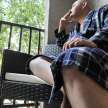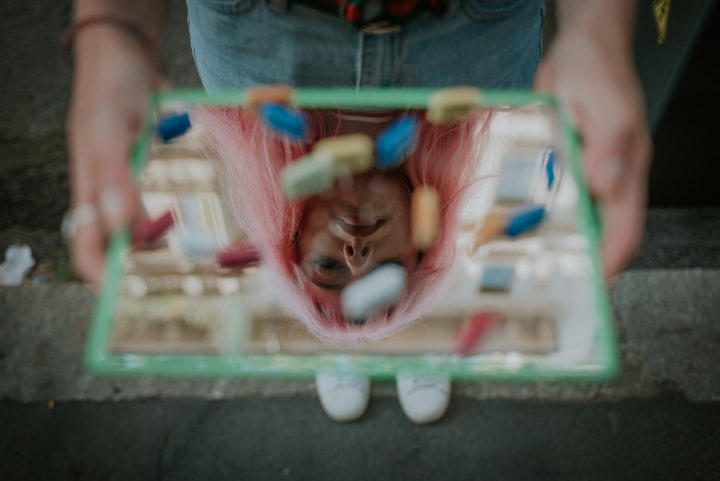
The first time it happened was on the anniversary of Fiona's death, five years previously, in his intern year of residency. He had moved to Miami to train as a psychiatrist, and in a moment of fragility, he purchased some pot from the gentlemen who delivered a chaise into his first floor condo.
He had moved cross-country with only those things that would fit in his car. With no other furniture to speak of, he sat on the faux leather chair in the center of the bare, white room in the blunted light of a frosted glass window scattering weakly on the soap stone floor, regretting that it wasn't more comfortable, and maneuvered the sticky plant through a bit of old rolling paper. He wanted to think. He had been living here in Miami's Coconut Grove for weeks with only a mattress and box spring. At work, the unfamiliar had been relentless. The patients had been ill, or desperate. Medicine was difficult.
As he became high, sitting alone in the center of the rectangular room with bare white walls shutting out the hostile world, he reflected on an event from the past week, and came to the erroneous conclusion that one of his attendings was intentionally withholding proper treatment from African American patients, increasing their risk of stroke and cardiovascular disease. He would spend hours transfixed by the memory of the way the senior doctor had looked at him as she passed his borrowed office in the primary care clinic, after he diagnosed a stroke that even the neurology residents found dubious until proven by imaging; she had stared at him, probably benignly, perhaps even with admiration (in fact, her feeling was the guilt that doctor's feel when one of her patient's has a bad outcome) but in a state of mild psychosis he attributed to that glance no end of meaning. "She is worried that I'm on to her. She was intimidating me." This idea was an external attribution ("projection") of his own self-doubt and deep feelings of being an imposter. Projection drowns out accurate mentalization when we are short of actual empathy, he would later teach.
Paranoia persisted in the clinic the next day, and he found himself screaming at a medical student.
Word of his outburst went from the medicine residents to the chiefs, and from the chiefs to the psychiatric training director, Dr. Vasyli Constantino, a Boston-trained, Romanian psychoanalyst, and finally up to the chairman himself, Dr. Bradford, a legend in the field of neuro-endocrinology, who had personally saved Artur from unemployment, hiring him for the residency position outside of normal channels. After being pulled into the office of the director, having been stared at briefly like a psychiatric patient by the Chiefs, Artur was wrecked with fear, and continued to act strangely.
Drs. Constantino and Bradford sighed deeply. "We could not call ourselves psychiatrists if we did not give you a chance to work this out." They simply told him to go home. He would be on medical leave for the next month.
This is how the first months of Artur's psychiatric training ended, so compromised had he become, a mumbling universe of insane conclusions.
***
After becoming briefly psychotic, Artur noticed that he could not breath well, and that he lost the craving for cigarettes. Guilt and fear over his outburst and loss of standing had been so intense that his relationship with his body had broken. He was ill for a few more days, and mostly sat on the edge of his mattress without moving, as he replayed all of the events of the previous days through his mind. What happened? Was there something wrong with the pot? Would he ever feel and function normally again? Was this new onset schizophrenia? Was it catatonia? He experienced himself as "stuck;" if there was a desire to move, it was buried so deeply under a need for his own stream of thought that he simply sat, struggling with the concept and experience of reality, like a man swimming toward the surface as his hunger for air pressurizes within him. He sat from morning until night without moving. As the sun set in the window behind him, the green fluorescent lights of the bar on the other side of his patio leaked through the blinds, the walls came alight with electric green, like the surface of a pond sliding with the backs of frogs.
***
As he went without food or water or smoke for over 10 hours, what remained of his mind began to fail. The medical part of his mind had decided that this must be genuine psychosis, and therefore he could not trust his own recent thoughts. He had suffered a brief paranoid delusion. His behavior was disorganized: he spent an hour looking for the key to his apartment in his car after arriving home, without realizing that he had previously unlocked the door and left the keys inside; he was convinced that he was locked out, when all the while the door was open; memories were getting lost. He hadn't hallucinated, but his motor activity had changed dramatically. He was affectively dysregulated with reduced impulse control. It must have been the pot, he reasoned. Recalling his conversation with Drs. Constantino and Bradford, he speculated that they had more or less deduced what had happened, and that he would have appeared psychotic to more experienced clinicians. This was a disaster.
He wanted to apologize to the medical student, but it was too late. He had been told not to make contact. He wanted to apologize to his chiefs, and to Dr. Bradford, who he had a deep sense of having failed. It was only as he began to grasp what had happened to him that he regained the ability to move. Exhausted, he found that he could rise slowly, walk over to the window, and pull shut the blinds. The green light vanished and the room was dark. There were laughs and drunken screeches carrying across the parking lot of the bar. He stripped himself down and laid in bed, falling asleep with some relief that a rational part of his mind remained intact.
The next morning he decided to get on a plane and go home to Texas. It took him about an hour to buy a plane ticket online, and he became stuck again as he packed his bag. He sat for several hours with a pair of socks in one hand, as he considered how he would explain to his parents what had happened. The truth would have to suffice. "I smoked some pot. I became psychotic. I am on leave and I need help getting to a doctor."
At the airport, he found that his perception of other people had acquired a strange new quality. The paranoia had lifted. He felt calm as he wandered the corridors and waited in the lines of MIA. He became anchored to the way in which his body appeared to respond involuntarily to the bodies of others, the way his neck straightened in response to the stride of a stranger one-hundred feet away. In the crowds of people, he laughed quietly to himself; he had lived his entire life unaware of the way in which bodies responded to one another involuntarily, postures and gaits engaged in a perpetual dance, constant communion. This was not Freud's unconscious. He was completely submersed in the actual, constant stream of body language, over which no one had control.
***
"Genuine empathic failures become the seeds of delusion, spurred into elaboration by a combination of preoccupation, and accelerated thought; there are no delusions without ideas of reference," he would later explain to his students.
"We are always communicating," he added.
About the Creator
Zyg Nota
An academic psychiatrist, writing about people and the world from a materialist and phenomenological perspective.






Comments
There are no comments for this story
Be the first to respond and start the conversation.